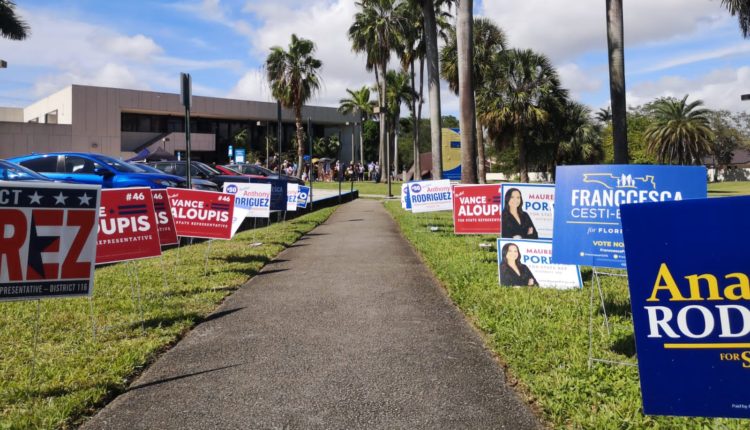 Photo by Carlos Ernesto Escalona Martí / Kako
Photo by Carlos Ernesto Escalona Martí / Kako
Emigration and the Cuba issue in the U.S. elections
About 870,000 persons of Cuban origin were registered to vote in the past elections in the United States, and the vast majority went to the polls. Various studies have shown that, as with the rest of society, the issues that tended to decide how people voted are those that directly affect their way of life; for example, the economy, public health and social security, among others. The issue of Cuba appears distant among their existential priorities, however, it constituted a mobilizing resource for the Cuban-American community, which frequently attracts the attention of political discourse in electoral campaigns.
There are historical reasons for this behavior. In the Cuban case, the decision to emigrate has always had a political component that survives during the immigration process, especially when in this process the benefits associated with the role of emigration in United States policy towards Cuba have had a determining weight. In this way, what at first glance appears to be a foreign policy issue, constitutes a domestic matter, which is related to the prioritized existential problems mentioned above.
The ideological base of the Republican machinery in the Cuban-American enclave of Miami was built on the subject of Cuba. To the point that the rejection of socialism continues to function as a factor of cohesion in this environment, even in times like this, when this Republican administration has treated Cuban migrants worse than ever. And although there has been a lot of excitement regarding the Cuban American support for Donald Trump, most exit polls, including those carried out by The New York Times, American Election Eve Poll and the New York Post, coincide that at the state level it did not exceed 56 percent, just two points above what Hillary Clinton got in 2016. However, more important than the amount, were the qualitative elements that distinguished this support.
Although it cannot be said that all the Cubans who supported Trump shared his excesses with respect to Cuba — there are studies that show this — the stridency of the campaign and the complicit silence of other opinions, leaves as a balance a speech where Republican Cubans were particularly cruel to their own at a time marked by the global crisis caused by the Covid-19 pandemic.
Faced with this level of passionate hatred, the first reaction is to assume that there are no possibilities for rapprochement, and in some cases it certainly feels that way, but to conclude that is not valid for all the island’s emigration. Nor can we ignore the vulnerability of the Cuban immigrant in an environment as hostile as Miami. Although it is not the only factor that can explain it, ultimately, anti-Cuban fanaticism is the result of the political manipulation exercised by the Cuban-American extreme right, which is most interested in avoiding dialogue between Cubans because it would diminish their predominant force in the Miami enclave. This explains that the degree of this fanaticism tends to be circumstantial, depending on the state of relations between the two countries.
Fortunately, the elections also taught us that, in a worst-case scenario, almost half of Cuban-American voters distanced themselves from the right and voted against Donald Trump. It is likely that in other places the issue of Cuba has had less weight than in Miami, but it is difficult to imagine that any Cuban in the United States has been able to abstain from taking a position on this issue, when deciding their vote for the Democrats.
Although it is a process that will have to face the strengthening achieved by the Cuban-American extreme right in these elections, not only in the enclave, where they recovered the two congressional seats lost in 2016, the elections leave us at a very convenient moment for positions in favor of the search or revitalizing a climate of agreement with Cuba, at least to the level left by the Obama administration.
This is the intention expressed by the president-elect and it does not seem that there will be difficulties in achieving this since it is enough to reestablish agreements previously reached. Joe Biden has no commitments that could hinder this objective and, more importantly, his victory has been the reflection of a spectacular opposition against the most reactionary U.S. tendencies where the Cuba issue is included.
Another lesson learned from these elections is that a change in the balance of the political forces that dominate the Cuban-American enclave of Miami constitutes a factor that will weigh heavily in the stability of the improvement of the relations of the United States with Cuba, so that Cuba policy should be aimed at facilitating this process.
In any case, the most relevant thing is that, apart from the antagonistic contradictions that prevail between the two countries, we are facing a very different scenario from the one that existed during the Trump administration years, which should favor advances in Cuba’s policy towards its emigration, in order to integrate it as much as possible to the nation’s project of development. We are at a juncture where a win-win situation seems to be the predominant trend and the opportunity should not be missed no matter how much old and new troglodytes shout in Miami.

